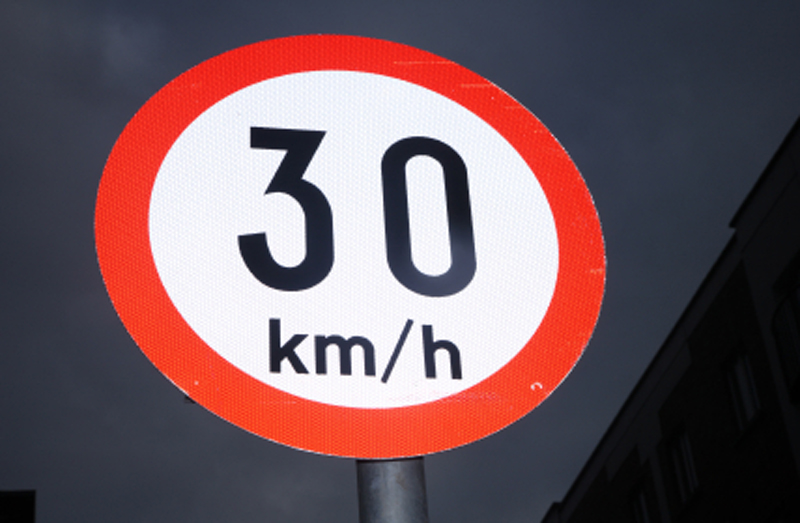Earlier this year, it was announced that speed limits on Irish roads would be reduced following a wave of high-profile road traffic accidents.
The Road Traffic Bill 2024 was signed into law by the President after being introduced by the Minister for Transport.
The bill will see speed limits on national secondary roads cut from 100km/h to 80km/h, from 80km/h to 60km/h on rural or local roads, and from 50km/h to 30km/h on roads in built-up or urban areas.
Dublin West TD Jack Chambers, then serving as junior minister at the Department of Transport, said “we have witnessed a very disturbing upward trend in road deaths in the last few years, which is continuing into this year; this new legislation seeks to bring systemic improvements to road safety including reductions in speed limits, reform of penalty points, and mandatory drug testing at the scene of serious collisions.”
“This is a key part of this Government’s strategy to reverse the trend of rising fatalities and help make our roads safer for all users.”
Of course, announcing legislation through a press release is one thing, actually implementing it is quite another.
Thursday’s meeting of Blanchardstown-Mulhuddart/Castleknock/Ongar Area Committee heard that Fingal County Council, as well as other local authorities across Dublin, are unlikely to have the infrastructure ready for November 2024’s deadline of reducing speeds from 80 km/h to 60 km/h on rural local roads.
Phase 2 of the plan, with a loose “Spring 2025” deadline, will see speeds reduced in urban areas from 50 km/h to 30 km/h.
More pressing for Fingal County Council is the need to install new speed signage, poles and brackets, but the meeting heard that the signs have yet to be ordered.
A workshop between Fingal County Council, other local authorities, and the government, which looks at the practical implications for phase 2, is yet to be scheduled.
The meeting heard that there has been “very little information” from the Department of Transport on the issue of speed limits around schools.
The national implementation of the plan, which is the biggest change to Irish road laws since January 2005, is likely to have some teething problems.
In Q3 of 2025, roads across Fingal County will be subject to a speed limit review but there is still some ambiguity as to the timeline.
Supply chain issues are likely to delay the rollout of updated signage across Fingal as the process will also be taking place nationally, with the meeting hearing that a “lag” is possible between the implementation of the new law and the signs being installed.
Fine Gael Ted Leddy said, “there will be a lot of consequential changes for a lot of our communities; we need to study it in-depth.”
Leddy questioned the November 2024 implementation of speed limit reductions on rural roads, asking “I assume that those speed changes won’t come into effect if the signs aren’t put up?”
“If a rural road is going to be 60km/h and an urban road is going to be 30 km/h, that’s a very big drop. There are several places where I imagine a happy medium is more suitable, like a 40-50km/h limit.”
“If the new speed limits come into force in November and the signs haven’t come up, there needs to be clarity that people won’t get penalty points for breaking the new speed limit when signs haven’t been put up.”
Councillor Tania Doyle asked if there was going to be a nationwide information campaign about the changes, and whether the changes were enforceable by law.
Labour councillor John Walsh added, “it’s really important to have communication and publicity; it’s important that people have advance information so that it’s not a situation in the first week of enforcement where people get fined through lack of knowledge.”
James Culhane, an engineer with Fingal County Council replied “if the signage isn’t up by November, the guards won’t be able to prosecute,” and said that he hadn’t received information if there will be a nationwide information campaign.
“We need further guidance from the Department of Transport,” he said.
Fianna Fáil councillor JK Onwumereh noted that the legislation was signed in April, but Fingal County Council has largely been left in the dark.
“In view of the fact the legislation was passed in April this year, where are we in anticipation of this legislation taking effect in November? Have we, as a council, even put things in place ahead of the implementation?”
Culhane replied “we’ve put in our signage request to Transport Ireland, and still waiting for the signage to come in for November,” and warned that the implementation of phase 2, which will be more substantial, will be a “mountain of work.”
Solidarity councillor John Burtchaell said “it’s generally a good idea to reduce the speed limits of vehicles on the road, but the key is how is it going to be enforced and in what way?”
“In the past, we’ve seen cases where enforcement seems to be ‘let’s shoot fish in a barrel’,” he remarked.
“Motorists will be caught, but it will have very little impact on reducing injuries and deaths, meanwhile some rural roads have serious safety issues that will go unpoliced.”
“I approve of the intention, if the intention is to save lives, but the means of this being enforced will be extremely important. Road safety should be judged not by the amount of people who are caught speeding, it should be by the number of deaths and injuries that have been reduced.”
